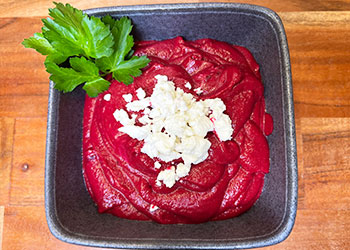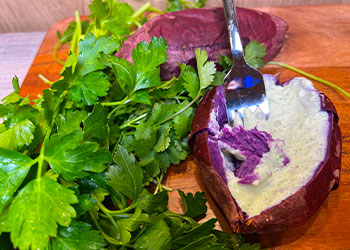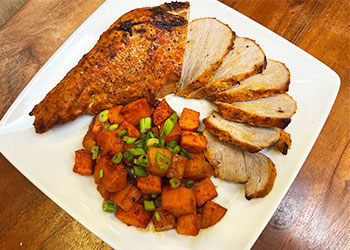The healing powers of this delicious, hearty-healthy beet dip come from phytonutrients called betalains that
possess a number of anti-inflammatory properties. All photos by Jessica VanRoo.
Root vegetables are increasingly found on trendy restaurant menus thanks in no small part to their high nutrient profiles and beneficial effects on cardiovascular health.
Heart disease — still the No. 1 killer of U.S. men and women, claiming nearly 700,000 lives each year — is largely preventable with lifestyle changes. The American Heart Association recommends eating a fiber-rich diet of vegetables, fruits, whole grains, legumes, nuts, fish and plant-based and lean animal proteins for heart health.
“Because root vegetables like beets, carrots, sweet potatoes, yams, parsnips, turnips, radishes and onions grow underground, they absorb a tremendous amount of nutrients from the soil,” says Katie Rankell, a registered dietitian and program director of the UCI Health Weight Management Program. “That makes them dietary powerhouses.”
Celebrate American Heart Month by eating more heart-healthy foods, starting with these delicious root vegetable recipes straight from the teaching kitchen of Chef Jessica VanRoo, executive chef of the Susan Samueli Integrative Health Institute, part of UCI Health.
Lemon Yogurt Goat Cheese Beet Dip
Serves 6 (Total cost: $6.43/$1.07 per serving)
Calories: 227 per serving (dip only)
 Beets are gaining popularity as a key part of a nutritional approach to managing cardiovascular disease. What gives beets their healing powers?
Beets are gaining popularity as a key part of a nutritional approach to managing cardiovascular disease. What gives beets their healing powers?
Let’s start with that deep red color derived from a plant-based nutrient called betalain. The more color a fruit or vegetable has, the more such phytonutrients it contains. Betalains have anti-inflammatory properties that help calm chronic inflammation associated with heart disease, obesity, liver disease and cancer. These healthy plant compounds also support the immune system and cellular activity, as well as defend against the harmful effects of damaging molecules called free radicals.
Beets also contain high levels of beneficial nitrates that are converted into nitric oxide, a molecule that dilates blood vessels and lowers blood pressure.
A half-cup of beets contains only 37 calories and 0.15 grams of fat while giving you 1.7 grams of fiber! They're rich in vitamins C, A and K, which contribute to good bone health. They also contain several B vitamins, including high levels of folate (vitamin B9) that is important for red blood cell formation and healthy cellular growth.
Serve this colorful, delicious beet dip with crunchy baked pita crackers and raw veggies for a nourishing snack or appetizer that everyone will love.
Ingredients
- 6 medium beets (1½ pounds), trimmed
- 2 small garlic cloves, minced
- 1 teaspoon lemon zest
- 1 cup plain Greek yogurt
- 2 tablespoons extra-virgin olive oil
- 2 tablespoons lemon juice, freshly squeezed
|
- 1½ tablespoons date or pure maple syrup
- 2 teaspoons cumin
- 1 teaspoon coriander
- ¼ cup goat cheese
- ¼ cup parsley, finely chopped (for garnish)
- Baked pita chips and/or raw veggies of choice
|
Directions
- Preheat oven to 375 degrees.
- Line two sheets of foil with parchment and wrap three whole beets in each sheet.
- Bake foil-wrapped beets 1 hour or until tender, which can take up to 1½ hours depending on the beets' size.
- Remove cooked beets from oven, peel and place in a food processor.
- Add remaining ingredients (except parsley, chips and raw veggies) and blend until smooth. Adjust seasoning to taste.
- Makes about 2 to 2½ cups.
- Serve with baked pita chips and/or raw vegetables.
Baked Purple Sweet Potato with Herbed Yogurt
Serves 4 (Total cost: $6.44/$1.61 per serving)
Calories: 261 per serving
 The people of Okinawa are renowned for their longevity, boasting the highest concentration of centenarians in the world. Purple sweet potatoes are a staple of their diet and for good reason. They are packed with fiber, antioxidants and anthocyanins.
The people of Okinawa are renowned for their longevity, boasting the highest concentration of centenarians in the world. Purple sweet potatoes are a staple of their diet and for good reason. They are packed with fiber, antioxidants and anthocyanins.
If you’re unfamiliar with them, anthocyanins are beneficial compounds that create impressive red, purple or blue-purple hues in fruits and vegetables. They offer anti-inflammatory, antiviral and even some anticancer properties.
Because of their high potassium and antioxidant content, eating purple potatoes may promote blood vessel health and lower blood pressure. A small, four-week study of people with hypertension found that eating six to eight small purple potatoes twice a day reduced both systolic and diastolic blood pressure levels by 3.5% and 4.3%, respectively.
Purple sweet potatoes also are packed with vitamin C, selenium and tyrosine. Selenium reduces oxidative stress, which has been linked to a higher risk of heart disease and stroke.
The fresh yogurt topping, mixed with cilantro and mint, enhances the beets' earthy, robust flavor while adding protein and probiotics that promote gut health. Cilantro contains an antioxidant called quercetin that balances the gut microbiome, reduces inflammation and can boost the immune system. Mint is also known for its calming effect on the stomach and provides vitamin A for eye health.
You can use this versatile recipe with any type of sweet potato, yam or regular potato so don't hesitate to add it to your weekly menu rotation!
Ingredients
|
Yogurt topping
- ⅔ cup Greek yogurt
- 2 tablespoons cilantro, finely chopped
- 2 teaspoons mint, finely chopped
- 4 green onions, finely chopped
|
Sweet potatoes
- 4 purple sweet potatoes
- 2 tablespoon avocado oil
- 1 teaspoon kosher salt
|
Directions
- Preheat oven to 400 degrees.
- Cut a cross about ¼-inch deep in each potato, coat with oil and salt, then wrap them in parchment lined foil sheets.
- Bake 45 to 60 minutes or until tender.
- Combine yogurt ingredients in a bowl, season to taste and set aside.
- Remove potatoes from the oven when tender, carefully remove foil and parchment wrapping.
- Place potatoes on a plate or platter and push the ends together to fluff the center of the sweet potatoes.
- Serve with herbed yogurt.
Gochujang Pork Tenderloin and Roasted Vegetables
Serves 4 (Total cost: $15.68/$3.92 per serving)
Calories: 455 per serving (using sweet potato and daikon)
 Gochujang, described by some as the love child of miso and sriracha with a hint of sweetness, is a smoky, spicy red chili paste popular in Korean cooking. Made from a chili powder called gochugaru, it has a heat profile similar to a jalapeño but with a gentle sweetness from a fermentation process that takes three to six months!
Gochujang, described by some as the love child of miso and sriracha with a hint of sweetness, is a smoky, spicy red chili paste popular in Korean cooking. Made from a chili powder called gochugaru, it has a heat profile similar to a jalapeño but with a gentle sweetness from a fermentation process that takes three to six months!
Fermented foods provide a host of probiotics that contribute to your gut health. Research shows that probiotics contribute to a modest reduction in blood pressure while helping to lower total and “bad” LDL cholesterols.
Pork tenderloin is deemed heart-healthy by the American Heart Association. It's considered extra-lean meat because it has less than 5 grams of fat and less than 2 grams of saturated fat per 3.5 ounce serving. It also is an excellent source of thiamine, vitamin B6, phosphorus, niacin, potassium, riboflavin and zinc.
Once again root vegetables take center stage in this recipe. Daikon radish, turnips and rutabaga are pale-colored root veggies that are often overlooked in American kitchens. Rich in folic acid, potassium, selenium, vitamin C and isoflavones, they help strengthen the immune system and may also protect against heart disease and cancer.
Although the squash included in this recipe are not root veggies, their hardness allows them to be cooked in the same ways. All varieties of squash are low in calories and high in fiber and antioxidants. They are rich in vitamin C and several B vitamins, beta carotene and a host of minerals like magnesium, which is vital to bone and heart health. Squash also are a colorful, nutrient-dense alternative to pasta and other processed carbohydrates.
This easy, exotic meal will perk up your palate and your plate!
Ingredients
|
Gochujang sauce
- 2 tablespoons gochujang paste
- 1½ tablespoons low-sodium tamari sauce
- ½ tablespoon ginger, fresh grated (about ½-inch piece)
- 2 teaspoons rice vinegar
- tablespoon avocado or canola oil
|
- 1 pound unpeeled vegetables such as sweet potato and butternut squash, kabocha or acorn squash (seeded) cut into 1½-inch pieces (about 3 cups)
- ½ pound (about 1½ cups) of daikon radish, turnips or rutabaga, peeled, trimmed and cut into 2-inch pieces
- 6 scallions, ends trimmed and cut into 2-inch pieces
- 1½-2 pound pork tenderloin, silver skin trimmed off
- Optional: brown rice
|
Directions
- Preheat oven to 425 degrees, line a baking sheet with parchment paper.
- Combine gochujang paste with tamari, ginger, vinegar and oil in a bowl.
- Toss cut vegetables with gochujang sauce then spoon onto baking sheet, allowing excess sauce to drip off before placing on baking sheet.
- Toss pork tenderloin in bowl with remaining sauce then place on baking sheet with vegetables.
- Season baking sheet contents with salt and pepper.
- Bake 40 minutes or until the tenderloin registers 145 degrees on meat thermometer.
- Remove roast from oven. Cover in foil and let it rest at least 5 minutes before slicing.
- If vegetables begin to brown before the roast is cooked, remove them from baking sheet.
- Alternatively, if the tenderloin cooks faster, remove the roast and continue baking the vegetables until brown and tender.
- Root vegetables are filling but if you have big eaters, serve with brown rice.
Related stories



